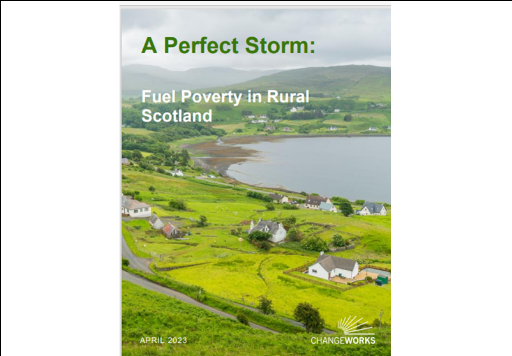Orkney Housing Association
Quality Affordable Homes for Orkney
Tel: (01856) 875253
Email: enquiries@ohal.org.uk
Tel: (01856) 875253
Email: enquiries@ohal.org.uk
29-5-2023 9:15

A Perfect Storm: Fuel Poverty in Rural Scotland, was commissioned by the Rural & Islands Housing Associations Forum (RIHAF), the Highlands & Islands Housing Associations Affordable Warmth group (HIHAAW) and Highlands and Islands Enterprise (HIE).
Orkney Housing Association Ltd (OHAL), as a member of RIHAF and HIHAAW, has backed the report published by Changeworks, and will help lobby for the changes it calls for.
The report sets out the causes, impacts and extent of fuel poverty in rural Scotland and outlines solutions that the Scottish and UK Governments and regulator Ofgem should implement. This includes improving how to identify households with enhanced heating needs, broadening the eligibility of existing support, delivering more support on the ground through trusted local organisations, and wider reforms of the energy market.
The energy crisis has seen rationing of electricity become a reality for an increasing number of OHAL tenants, with some burning bottled gas instead, despite financial support from governments, charities and OHAL itself.
Latest figures from an independent tenant survey put fuel poverty rates among Association tenants at 87%, with 54% in extreme fuel poverty. Over the winter OHAL was able to pay £125 to every tenant from the Scottish Federation of Housing Associations’ Fuel Insecurity Fund, with around 30% of tenants requesting a direct payment to their bank accounts, and the remainder having it credited to their rent accounts.
With this in mind, Energy Officer Robert Leslie said that it was hoped the calls for urgent action would be heeded, including better identification of households that are self-rationing and self-disconnecting – either reducing or switching off heating and hot water, or allowing key meters to run out.
The report also calls for longer funding periods – a minimum of three years - for advice services, which would include local affordable warmth charity THAW Orkney. This would remove the barrier of these bodies having to spend a disproportionate amount of time securing funding to keep running, and the loss of skilled advisors due to short, fixed-term contracts.
Mr Leslie, who represents the Association on HIHAAW, said: “Many of the impacts of rural fuel poverty have been well known to those of us working in the sector, but to see them set out so starkly in this report really hits home – especially the wider impacts, beyond those of living in cold, damp homes and the physical and mental health consequences. This includes social isolation due to not wanting to invite folk into cold homes, and inability to afford to take part in social events.
“The ‘Perfect Storm’ referred to in the title refers to the overlapping impacts of the causes of fuel poverty – energy prices, energy efficiency, income levels, and how energy is used in the home. The way these influence each other can literally drive folk out of their communities, and Orkney isn’t immune to this.
“The research highlights how fuel poverty has ‘spiraling impacts for local communities’. Some of those interviewed described how it is accelerating the wider issues of rural depopulation. Fuel poverty, combined with lack of employment opportunities and affordable housing is pushing working age folk and families towards more urban areas. That is bad news for communities like Orkney.”
Decoupling electricity and gas prices is one solution put forward by the report that OHAL has been lobbying on for several years, given the inequity that Orkney’s electricity is among the cleanest in the world, coming predominantly from renewable generation, and yet is charged for as if it is coming from a gas power station.
Mr Leslie also highlighted that the solution of ‘maximising local energy generation benefits’ through local ownership of energy assets was also something that Orkney could lead on, ensuring local wealth is generated from renewable energy.
“The recent Orkney Energy Conference, which I attended on behalf of OHAL, highlighted how Orkney needs to take the community along with us in the journey to net zero, as folk simply won’t buy into it as long as they are struggling to pay their next electricity bill. We all need to see the benefits of clean, green generation and OHAL wants to work with others in the community to make that a reality,” he said.
Other solutions in the report include the introduction of a social energy tariff and the acceleration of the smart meter rollout, which OHAL has been engaged with for several years due to delays caused by lack of a smart meter solution for certain multi-rate tariffs.
Also highlighted is the need for additional engineers to work through the backlog of broken electricity meters, with regionally based engineers seen as key to improving the efficiency of this work, enabling them to have specialist knowledge of the different types of meters commonly found in rural and remote areas.
Mr Leslie said: “We have been working with the Scottish Federation of Housing Associations to encourage suppliers to replace meters that have been either blank or frozen for lengthy periods – sometimes years – adding to the cost-of-living stress for the tenants affected. While some of these have now been sorted, we are still finding more so this is likely to be an issue until the relevant smart meters become available.
“It is crucial that the solutions put forward in this report are taken up by those with the powers to carry them out, and not least that the relevant solutions inform an update of the Scottish Government’s Fuel Poverty Strategy.”
Related link: A Perfect Storm - Full Report